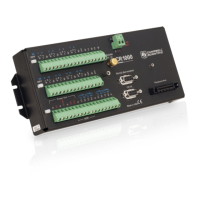Reference temperature = 25 °C
Delta T (temperature difference) = 20 °C
Thermocouple output multiplier at 45 °C = 42.4 µV °C
-1
Thermocouple output = 20°C • 42.4 µV °C
-1
= 830.7 µV
Input range = ±2.5 mV
Error Calculations with Input Reversal = True
µV error = gain term + offset term
= (830.7 µV • 0.12%) + (1.5 • 0.67 µV + 1.0 µV)
= 0.997 µV + 2.01 µV
= 3.01 µV (= 0.071 °C)
Error Calculations with Input Reversal = False
µV Error = gain term + offset term
= (830.7 µV • 0.12%) + (3 • 0.67 µV + 2.0 µV)
= 0.997 µV + 4.01 µV
= 5.01 µV (= 0.12 °C)
Input Error Examples: Type K Thermocouple @ 1300°C
Error in the temperature due to inaccuracy in the measurement of the
thermocouple voltage increases at temperature extremes, particularly when the
temperature and thermocouple type require using the ±200|250 mV range. For
example, assume type K (chromel-alumel) thermocouples are used to measure
temperatures around 1300°C.
These examples demonstrate that at temperature extremes, input offset error is
much less than input gain error because the use of a larger input range is required.
Conditions
CR1000 module temperature, –25 to 50 °C
Temperature = 1300 °C
Reference temperature = 25 °C
Delta T (temperature difference) = 1275 °C
Thermocouple output multiplier at 1300 °C = 34.9 µV °C
-1
Thermocouple output = 1275 °C • 34.9 µV °C
-1
= 44500 µV
Input range = ±250 mV
Error Calculations with Input Reversal = True
µV error = gain term + offset term
= (44500 µV * 0.12%) + (1.5 * 66.7 µV + 1.0 µV)
= 53.4 µV + 101.0 µV
= 154 µV (= 4.41 °C)
333

